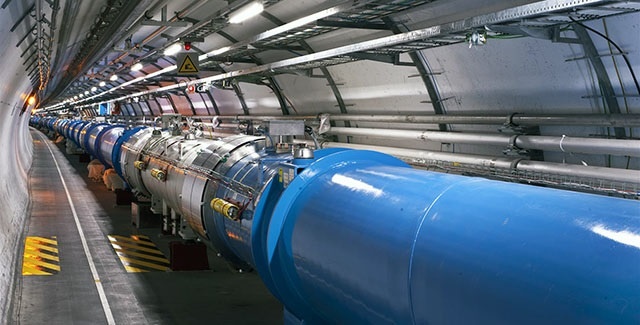Institute of Corpuscular Physics hosts on Thursday the 78th meeting of the International Committee for Future Accelerators (ICFA). The representatives of the main laboratories and research centres in the world involved in particle physics attend the meeting. The main representative, Fabiola Gianotti, and directors of other leading scientific institutions in Europe, Russia, China, Japan, Canada and United States attend also in this event. Among the issues to be addressed highlights the construction of the particle accelerator later LHC.
Institute of Corpuscular Physics (IFIC, CSIC-UV) hosts on 16 and 17 February the 78th meeting of the International Committee for Future Accelerators (ICFA). The representatives and directors of the main laboratories and research centres in the world involved in particle physics attend the meeting. This discipline studies the components of matter using large accelerators such as the Large Hadron Collider (LHC) by CERN. The main representative, Fabiola Gianotti, also participates in this event together with directors of other leading scientific institutions in Europe, Russia, China, Japan, Canada and United States. Among the issues to be addressed highlights the construction of the particle accelerator later LHC.
The International Committee for Future Accelerators (ICFA) was created in 1976 to facilitate scientific cooperation in particle physics, especially regarding the construction and operation of its principal tools, particle accelerators. These tools are based on the new Einstein equation to turn energy into new particles, recreating the conditions that should exist after the Big Bang. Being aware of the international cooperation required for this field of research, with accelerators even more large and expensive, the people in charge of the main laboratories in the world created this forum where they can gather to discuss the future of this discipline.
In its 40 years of existence, it’s the second time this meeting is held in Spain. The first one was on the occasion of the premier global conference in Particle Physics, ICHEP, which was held in Valencia in 2014. Also, it was held for the first time in Spain, organised by the Institute of Corpuscular Physics (IFIC) centro mixto del CSIC and the Universitat de València. The IFIC researcher Juan Fuster Verdú is the chairman of the Particle Physics Commission of the International Union of Pure and Applied Physics (IUPAP), institution that ICFA funds.
Among the issues to be addressed in the next meeting of ICFA is the construction of the particle accelerator later LHC. After discovering the Higgs boson in 2012, the missing piece of the theory that describes the elementary particles and its interactions, with only two years of operation, the LHC is now in its second period of operation (Run 2). A major update of the machine is foreseen to gather 10 times more data in its collisions, and its operation is foreseen for another decade.
But some alternatives are almost ready. One of the most progressive projects is the International Linear Collider (ILC), a particle accelerator of about 30 kilometres in length that Japan wants to get. Contrary to LHC, this type of accelerator is linear, not circular, and makes matter and antimatter (electrons and positrons, not protons) clash with lower energy. That’s make it more accurate. CERN has also its own project of linear accelerator, CLIC. Both projects are discussed in the ICFA meeting of Valencia.
Regarding the long-term future, scientifics are already thinking about next circular accelerator that could replace LHC when it stops working, in 2030. The world's largest particle physics laboratory, CERN, works to study the viability of Future Circular Collider (FCC) with a circumference of about 80 or 100 kilometres (LHC has now 25). And recently, China grab the headlines when announcing the construction of a particle accelerator, larger than LHC in 2025.
“The future of Particle Physics won’t be decided by only one country, not even a continent. The future of this discipline and the particle accelerators goes through an international collaboration increasingly tighter”, has stated Juan Fuster, organiser of the meeting. As a representation of the main laboratories and research centres of Particle Physics, ICFA gathers the representatives of funding agencies of the countries involved, which will finally decide the investment in future accelerators.


